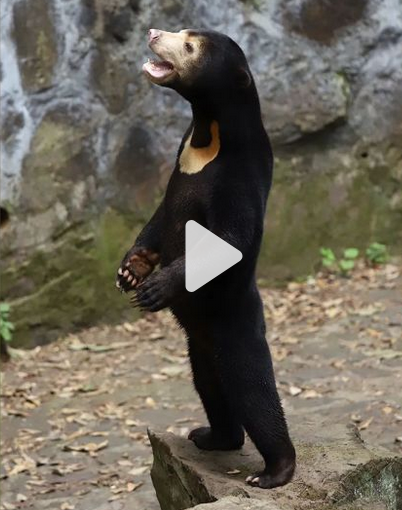Following the spread of films showing a Malayan sun bear standing on its hind legs and seeming uncannily human, which sparked rumours and conspiracy theories on Chinese social media, an eastern Chinese zoo has refuted claims that some of its bears are human impersonators.
Officials from the Hangzhou zoo said that people “didn’t understand” the species in a letter written from the viewpoint of a sun bear named “Angela.”
The statement began, “I’m Angela the sun bear; I received a call yesterday after work from the head of the zoo asking if I was being lazy and skipped work today and found a human to take my place.”
Once more, let me state to everyone that I am a sun bear, not a black bear or a dog.
Videos of a sun bear perched on a rock and gazing outside of its enclosure were posted on the well-known Chinese microblogging website Weibo.
Many Weibo users saw the bear’s erect stance and folds of loose fur on its back, which gave the bear an unusual appearance and stoked rumours that a human imposter might be passing as the real thing.
It can seem like a ridiculous gambit. Zoos in China, however, have faced backlash in the past for attempting to pass off domestic pets like dogs as wild animals.
A local zoo in the Henan province’s central region infuriated tourists in 2013 by attempting to pass off a Tibetan Mastiff dog as a lion. When they heard the “lion” bark, visitors who had just entered the enclosure were startled.
A golden retriever was seen sitting in a cage marked as an African lion habitat, shocking visitors at another Chinese zoo in Sichuan province.
The smallest bear species in the world, sun bears are indigenous to Southeast Asia’s tropical forests. According to scientists, adult bears can reach heights of up to 70 centimetres (28 inches) and weigh between 25 and 65 kilogrammes (55 and 143 pounds).
In addition to not hibernating, they have long tongues that enable them gather honey from bee hives and amber-colored crescent-shaped fur patches on their chests, giving them the moniker “beruang madu” (honey bear) in Malaysia and Indonesia.
According to conservation organisations like the World Wildlife Fund (WWF) and Bornean Sun Bear Conservation Centre (BSCC) in Sabah, Malaysia, their numbers in the wild are under threat from poachers and deforestation and have decreased by 35% over the previous three decades.
The International Union for Conservation of Nature (IUCN) has placed sun bears on its list of threatened species.

